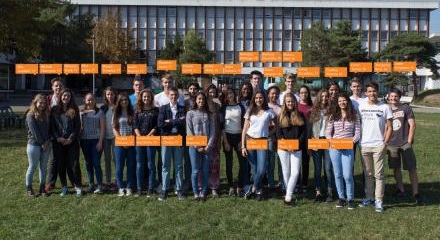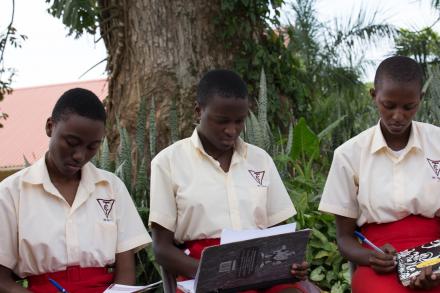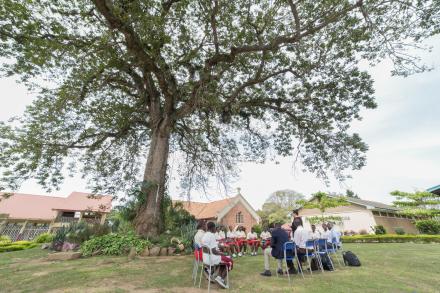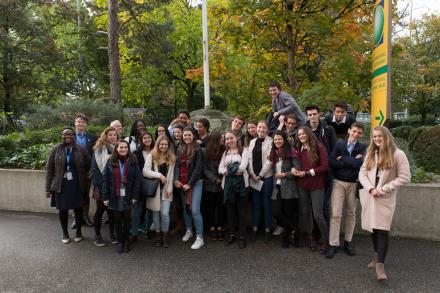Youth Climate Dialogues (YCDs) Go Beyond Swiss Borders
9 November 2016, Geneva, Switzerland - Following is one of the many personal experiences one student from Lycee International de Ferney-Voltaire shared during the last Youth Climate Dialogue (YCD).
“As a kid, every autumn I used to visit my grandmother and we would collect many apples from her apple tree. For days I would eat apples for breakfast, lunch and dinner. She always used to say, ‘an apple a day keeps the doctor away’. It’s been 5 years since the last apple was seen on that tree.”
On the 19th October 2016, the first YCD took place in a French school. The dialogue was between the Lycee International de Ferney-Voltaire (France) and the Trinity College Nabbingo (Uganda).


The Lycee International de Ferney-Voltaire has a Model United Nations (MUN) club which hosts a global scope conference annually with students from other schools and countries. The MUN is an activity that encourages students to participate in international relations and diplomacy by simulating the United Nation and its debates. The participants are part of the MUN club.
The Trinity College Nabbingo has activities in agriculture, participates in the annual schools Farm Camp and is striving to make strides in sustaining food supply from the school farm. The school has a student population of about 1,500 students.
The event started off as many of these dialogues do, with students and teachers alike feeling their way in a strange and unfamiliar space; and it ended more than 2 hours later (well over time) with cheers, smiles and new resolutions.


Students from both schools discussed how climate change affects them and their countries, what is happening in their local communities, how the impacts of climate change are influencing their respective lives and the roles they can play as youth. The Trinity College Nabbingo students explained the dire consequences of climate change on the agricultural sector in Uganda which is the backbone of their economy. They shared how their grandparents used to tell them stories of the beautiful environment years back and how they could easily predict the rain and dry seasons using indigenous knowledge which has since changed.
As any normal debate, it was not short of controversial issues. The youth talked about the role of good governance such as anti-corruption policies and practices in the fight against climate change. The choices of being a vegetarian was not left out either.
Amongst many issues discussed, it was interesting to see how students from both sides have all these great ideas and have aspirations for the future. “If you had all the power of the government in Uganda, what would you do with it”, asked a Ferney-Voltaire student to Trinity College Nabbingo in Kampala. “Well I love this question” answered one of the Ugandan school girls. “And yes I do believe that I will one day have this power”. More cheers and claps from all sides.


Students from both sides worked on various projects in preparation for the dialogue. In order for the students to have an opportunity to think about the subject without much influence from the scientific front, the brainstorming sessions were designed in a way to allow the students to reflect on their own personal experiences of climate change.
Members of the UN CC:Learn Secretariat supported the students’ preparation in both countries. Mr. Bob Natifu, Senior Climate Change Officer-Outreach with the Climate Change Department, Ministry of Water and Environment of Uganda and UN CC:Learn Ambassador for Climate Change Learning, also met and interacted with the girls of the debating club at Trinity College Nabbingo in advance of the dialogue, supporting the discussion and answering all questions.

Students were then encouraged to take the UN CC:Learn e-course on climate change only after the dialogue, so that they are not influenced too much by standard and globalized scientific narratives. This way the students had a greater chance to reflect on their direct experiences from their own personal viewpoints.
Projects prepared by the students include photo-stories, interviews and two videos.
- "Draw My Life" - This video is a story about a girl, Julie who lives in Ferney-Voltaire. Julie shares how climate change is affecting her life.
- "Climate Change Interview from Lycée International de Ferney-Voltaire students" - This video features interviews about climate change with the general public.
The dialogue ended with cheers, new friendships and many resolutions as the Uganda students put it “continue to spread the climate change gospel to the rest of the world and in our communities”.
This was the first of three YCDs currently being organized with French schools in 2016-2017. The other two will take place in Ethiopia, one of which will be in a refugee camp. Youth Climate Dialogues are exchanges where youth from different perspectives get to discuss how climate change impacts them and work together to find solution. These dialogues respond directly to the Paris Agreement on Climate Change, in particular Article 12 on climate change education. More information on the organization of Youth Climate Dialogues can be found on the UNCC:Learn website (www.uncclearn.org/youth-climate-dialogues)
The UN CC:Learn Secretariat would like to thank the Governments of Switzerland and France for their support and efforts in promoting climate change education, training and public awareness around the world.
About UN CC:Learn
UN CC:Learn is a partnership of more than 30 multilateral organizations supporting countries to design and implement systematic, recurrent and results-oriented climate change learning. At the global level, the partnership supports knowledge-sharing, promotes the development of common climate change learning materials, and coordinates learning interventions through a collaboration of UN agencies and other partners. At the national level, UN CC:Learn supports countries in developing and implementing national climate change learning strategies. Through its engagement at the national and global levels, UN CC:Learn contributes to the implementation of Article 6 of the UNFCCC on training, education and public awareness-raising, and the 2012-2020 Doha Work Programme. Funding for UN CC:Learn is provided by the Swiss Government and UN partners. The Secretariat for UN CC:Learn is hosted by the UN Institute for Training and Research (UNITAR).
Photo 1: Participants from the Lycée International Ferney-Voltaire. The Lycée is a French public secondary education school on the border with Geneva.
Photo 2: Participants from Trinity College Nabbingo. It is an all-girls boarding school in the village of Nabbingo, approximately 8km from Kampala in Central Uganda.
Photo 3: The video teleconference dialogue between Lycee International de Ferney-Voltaire and Trinity College Nabbingo students.
Photo 4: The lively debate had many fun and cheerful moments.
Photo 5: Participants from Trinity College Nabbingo during one of the brainstorming sessions in preparation for the dialogue.
Photo 6: Preparations for the Youth Climate Dialogue in Uganda, Trinity College Nabbingo (Uganda) – October 2016.
Photo 7: Mr. Bob Natifu, UN CC:Learn Ambassador for Climate Change Learning with the students at Trinity College Nabbingo (Uganda) – October 2016.
Photo 8: Group photo of UNITAR GCP, teachers and the students from the Lycee International de Ferney-Voltaire.


